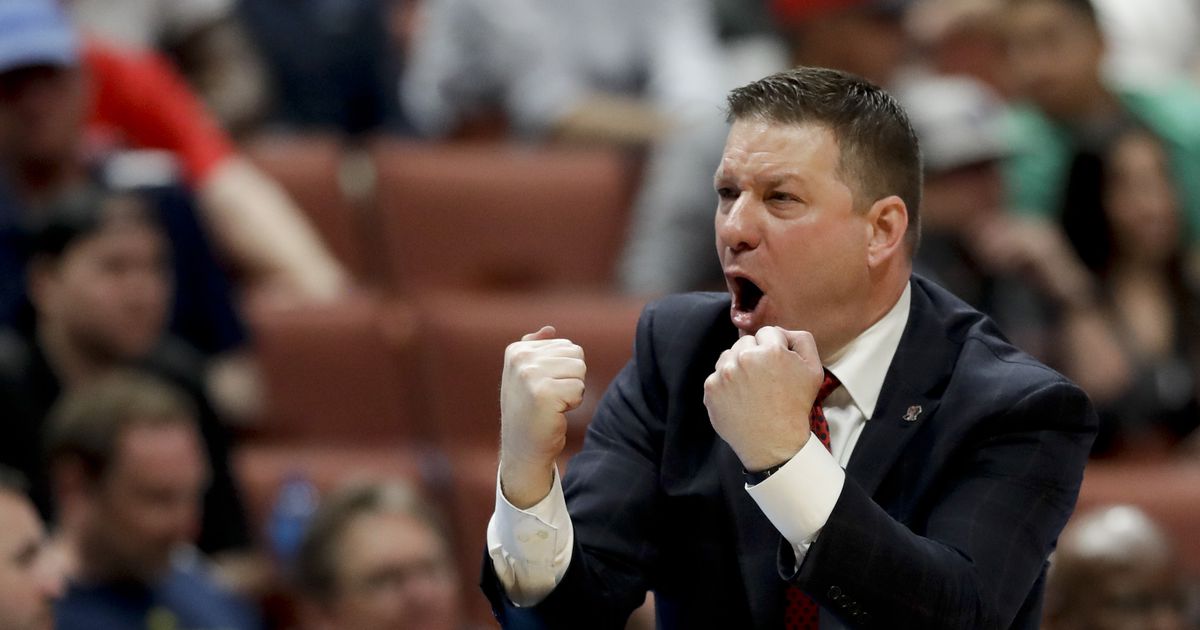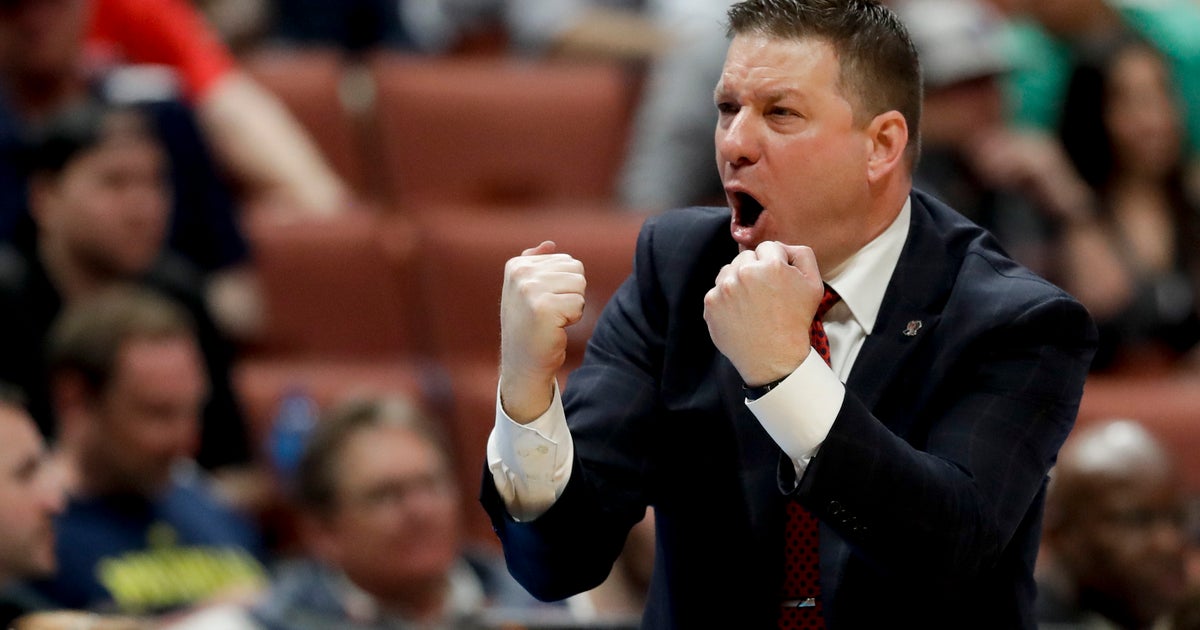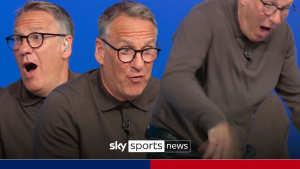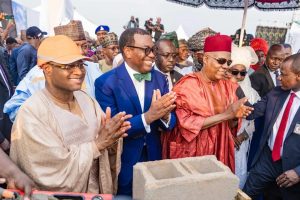Texas Tech’s coach spends life on edge, as an underdog


ANAHEIM, Calif. (AP) — Chris Beard burst onto the scene at the NCAA Tournament three years ago with a splint on his hand, a chip on his shoulder and a nagging thought that all but guaranteed he would never get outworked: Guys like him only get one chance.
The hand has healed. The chip — it’s as big as ever. As for that thought — well, even though he’s taken Texas Tech to the brink of the Final Four for the second straight year, chances are it will never really go away.
Beard comes from the Bob Knight coaching tree, which helps explain how he broke his hand during a halftime fight with a locker room grease board when he was coaching Arkansas-Little Rock to the tournament, and an eventual upset of Purdue, in 2016.
Yet the story of this 46-year-old hoops coach in a hurry is not one of uncontrolled rage, a la Knight in his worst moments, but rather, one about the lessons of life, and coaching, that get learned when nothing comes for free.
“I wasn’t a great player, I don’t have a famous grandfather,” Beard said, in explaining his ethos back in 2016. “I get up every day, surround myself with winners. Every day I feel like I’m an underdog.”
He’ll be one again on Saturday, when third-seeded Texas Tech faces No. 1 Gonzaga with a trip to the Final Four on the line.
But the math is changing.
Yes, Gonzaga has two NBA-caliber big men in Rui Hachimura and Brandon Clarke, along with the nation’s top-scoring offense and a coach who has taken the exact opposite career path as Beard. Over the past 30 years, Mark Few has been at exactly one school.
But Texas Tech has one NBA-caliber big man of its own — Jarrett Culver, who could’ve gone a lot of places, but chose to stay close to home, to try to build something with Beard in Lubbock — along with the nation’s most stifling defense.
Beard’s career path, it turns out, is working out, too. Over the same 30 years Few has been at Gonzaga, Beard has wound through 12 spots (13 if you count the 19 days at UNLV — more on that later), sweeping gym floors, taping ankles and writing game plans at Incarnate Word, Fort Scott Community College, Seminole State and a handful of other outposts where 737 jet service is not available.
“I’m always trying to act like I belong, and that’s just me,” Beard said. “How I keep those players feeling the same way, it’s just who we are. We’ve got really good players, but we don’t have any McDonald’s All-Americans. We don’t have anybody on our team that has been given anything.”
Since nothing comes easy, Beard has built a team that cedes ground very unwillingly.
At the most basic level, the key to a Texas Tech defense that has allowed more than 65 points in only nine of 35 its games is clogging the middle and giving teams — most of them presumably with more offensive talent than Beard could ever dream of — only bad choices: Work the ball to the baseline and try to make something happen from those tiny slivers of space, or take your chances driving the lane and paying the price.
Asked how the players make the system work, Culver said they have to, lest they “have to deal with Coach Adams” — assistant coach Mark Adams is the team’s defensive guru.
What, pray tell, does “dealing with Coach Adams” mean?
Beard interrupted: “I think it’s the same thing that happened at Michigan State, and it’s called coaching.”
The message there is that Beard would have no compunction about being like Tom Izzo (or Knight, for that matter), who got called out last week for his very public berating of freshman Aaron Henry during the Spartans‘ first-round win over Bradley.
And yet, for all his talk about tough love, Beard’s most viral moment so far this tournament came when he stopped a team meeting and brought tears to the eyes of his Italian-born guard, Davide Moretti, whose family was waiting in the back of the room after flying in from Italy to watch him play.
“When I first got here, he just made me feel included and confident right away,” said Matt Mooney, a graduate transfer from South Dakota who arrived for this season. “He talked me up a little bit in front of the guys, and he’s real good at putting guys in the right positions and making you feel like you’re part of the team right away.”
In Beard’s world, the team is a family — but as everyone knows, basketball families operate in one-year cycles; that specific group only gets one chance to do big things together.
It’s why Beard always feels bad for seniors who get stuck on programs going through coaching changes. A coach who moves around as much as he has is bound to encounter a few of those seniors along the way.
“You bust your ass for four years, then your senior year, a coaching change happens, and all of a sudden, some new guy comes in, and he’s talking about building it,” Beard said last year, the day before Texas Tech fell to Villanova in the Elite Eight. “I mean, ain’t got time to build it.”
It may lend some insight into the biggest blemish on Beard’s resume. Earlier this week, he declined to go into details about his hiring in 2016 at Texas Tech, which came only 19 days after he had left Arkansas Little-Rock to take an open job at UNLV.
It was certainly not his proudest moment, but clearly, Beard felt Texas Tech — a place with more money in a bigger conference, and where he had previously been an assistant for Knight — offered an opportunity to do bigger things more quickly.
Regardless of the reason, it takes a certain kind of guy to leave Las Vegas for Lubbock: Perhaps, the kind of guy who thinks he’ll only get one chance.
“We’ve got a chip on our shoulder,” Beard said. “We weren’t supposed to be here.”








